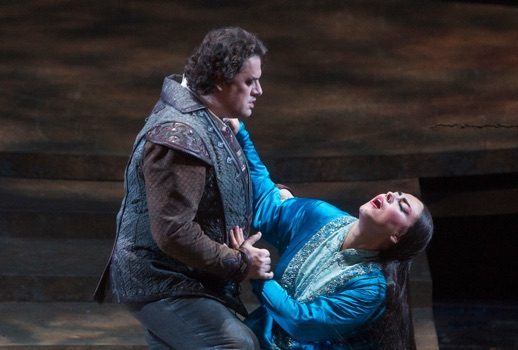
Kiss Kiss Bang Bang
From the perspective of current identity politics, Puccini’s Turandot is a disaster of epic proportions: a dumpster fire of misogyny and racism. Its plot concerns a Pekinese princess who avenges her female ancestor by slaughtering a host of misguided suitors. That is until a mysterious prince named Calàf melts her icy, bitter heart with his virile advances—a conflict and resolution tantamount to rape.
It gets worse. Along the way, the audience encounters a host of cultural appropriations (including, if one can believe it, characters named Ping, Pang and Pong—not to be confused with a similarly named Dim sum restaurant, located at the Gold Coast Casino in Las Vegas, NV). There’s also a great deal of yellowface, and, for good measure, some disgusting theories on the nature of women—in short, the opera is relentless in its efforts to consume, ridicule, and degrade.
And what does one make of the Metropolitan Opera’s treatment of this ignorant mess, a production that had its premiere at the house back in 1987? A tacky tornado of glitter and fabric, assembled with a manic, homosexual glee by that carnival barker of the opera world, Franco Zeffirelli.
His approach can be described in two modes, both insipid. In one sense, the production strives for a perverse permutation of hyperrealism, with a dash of old school, showbiz panache. For example, the interior of a Chinese palace is rendered with a ridiculous amount of detail, leaving nothing to the imagination. And within this tableau, Zeffirelli irresponsibly parades a sampling of cultural practices in order to lend the proceedings a bit of verisimilitude.
However, these gestures swing so wide, and miss so remarkably, that the staging reads less as an invitation to another time and place, and more as an exercise in glib, camp aesthetics. “Don’t take it so seriously!” the production seems to command, archly winking, reveling in its own vulgarity.
This is especially true of the handling of Turandot, who undergoes many costume changes—veils, caftans, headdresses, studded with rhinestones—and is directed to scowl, simper, tip-toe, and snap her head, all while wearing a hideous black wig. She is a drag queen of the highest order. Unfortunately, this is a strain of drag deployed by out-of-touch, surreptitiously misogynistic gay men.
The opera had its season premiere on Thursday night, and the current cast did their best to assume these roles with as much dignity as possible. Standing regally in the midst of this hurricane of bad taste was Oksana Dyka as the title character. Her laser-like soprano pierced through the muddle and into the house.
All of the princess’s ferocity, anger, and bitterness were embodied in that iceberg of a voice. While at times there was a wild, unwieldy quality to her singing, almost shrill, her Turandot was, in general, a vocal success. And her zany, over-the-top acting seemed the only legitimate option in light of her character’s insane situation.As her suitor/rapist Calàf, Aleksandrs Antonenko sang in a rich, hearty tenor that was a pleasure to hear. However, his intonation went awry during the most climactic moment of the Act III showstopper, “Nessun dorma,” marring an otherwise strong performance.
As Turandot’s foil Liù, Maria Agresta remained nondescript and forgettable. Her stage presence exemplified the character: a pathetic servant girl, devoted to Calàf because he smiled at her. She followed the tottering King Timur (sung with warmth and elegance by veteran James Morris), popping up when least expected. Agresta made the best of an idiotic role. Her voice was sporadically beautiful, warm and lush. And she was most successful when it counted—during the arias “Signore, ascolta!” and “Tu, che di gel sei cinta.”
Then there were Ping, Pang, and Pong, who fluttered about the stage, often doubled with fierce, fan-snapping dancers (not since Paris is Burning has so much shade been thrown). Alexey Lavrov, Tony Stevenson and Eduardo Valdes did what they could with these caricatures. Their singing was especially effective during the more lyrical sections of Act II.
Maestro Carlo Rizzi’s conducting was merely perfunctory, lacking the noble grandiosity Puccini’s score invokes. He also rushed the singers through the opera’s flashier moments—including Liù’s “Signore, ascolta!” and the climactic ending of “In questa reggia…”
Despite their moments of success, one wonders what sort of project these performances were ultimately contributing to. In 2015, in his review for the New York Times, David Allen had the sense to ask, “Is it right, today, to show Turandot so unquestioningly, and so unashamedly?”
The answer, as it was back in 1987, is no. Think harder; do better—either with an eye toward the opera’s more egregious crimes against intelligence and taste, or not at all. If Turandot is to remain in the repertory, then someone has to find a thoughtful, more responsible way to present this work, with both questions and shame—indeed, there are aspects of the text we should be ashamed of. Otherwise, we end up with soft-minded nonsense, an example of which one has found on the stage of the Met for the last 30 years.
Photo: Marty Sohl/Metropolitan Opera



